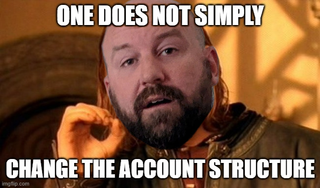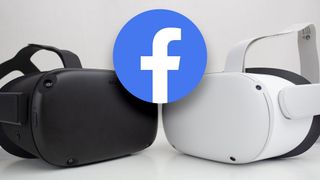Here's why Meta hasn't removed the Quest Facebook login requirement yet
It's been over half a year since Facebook changed to Meta, but Oculus Quest users are still stuck in the past.

Amidst all the cool revelations about new AR/VR headsets, realistic avatars, and GTA VR, Meta Connect 2021 had one seemingly small announcement that inspired universal joy from Oculus Quest owners at the time: Zuckerberg said that "we’re making it so you can log into Quest with an account other than your personal Facebook account."
"Not everyone wants their social media profile linked to all these other experiences. And I get that," Zuckerberg continued. He said they would start with work profiles and then more broadly remove the Facebook requirement "within the next year."
That was in late October 2021; it's been more than half a year since Meta changed its name, and it's still the case that if you delete your Facebook account or the company bans it for TOS violations, you lose access to your Quest account and your entire purchased gaming library.
While Meta technically has until this October to disable the Quest Facebook login requirement, most VR experts assumed the policy change would have come by now. I emailed Meta reps asking for an update in early May, and they responded that "we don’t have anything to share right now beyond what Mark said at Connect" but would keep me posted.
But thanks to a recent Instagram AMA by Meta CTO and Reality Labs head Andrew "Boz" Bosworth, we have a slightly clearer view of what's taking so long. Asked if he could give "any new information about log in options for Quest beyond Facebook," Boz responded:
pic.twitter.com/4FjxLZkximMay 13, 2022
"Yes, this is still in the works, still on the way. One does not simply change the account structure. It turns out those data privacy regulations around how data is owned, how it's moved, how it's managed are of critical importance to how we work at Meta. And we're having to work through all due care and diligence as we make these transitions. But we are still working on this, it's still going to happen — so, stand by."
What's the holdup? Your data

There are obvious roadblocks to adapting a video game console to work with two separate account systems. Meta must ensure both systems work correctly with the store and communicate with games. And it must guarantee Facebook account data transfers over to the new system properly, so no purchases or settings are lost. No doubt it was a technical challenge.
Be an expert in 5 minutes
Get the latest news from Android Central, your trusted companion in the world of Android
But Boz's explanation made it clear data policies are holding up the transition, not technical issues. Meta must carefully consider how your data is owned, moved, and managed before it completes its new account system.
So, what does your data have to do with it? Everything.
Road to VR has a great round-up of all the personal data your Oculus Quest 2 headset collects from you. But to summarize the main categories, your Oculus account stores your real name, email, friends, game library and data, usage stats, and other personalized data and settings.
All modern video game consoles collect this data. But Quest syncs it with your Facebook account, which Meta uses to build demographic data and ad profiles. Meta can take its 10 million or more Quest 2 owners and determine your favorite Quest games or average playtime based on age groups, gender, politics, hobbies, or other specific categories that make the ad data more profitable.
Meta may want to ensure it can connect new accounts' data to what's already been collected, even if you're no longer technically logging in through Facebook. Or perhaps there are some legal issues with that — hence the possible data ownership or management delays.
Regardless, this new system will ensure that new Quest 2 buyers, or future buyers of Project Cambria or the Quest 3, won't have their data tied to Facebook. And that's a problem for Meta right now.
Recent Meta earnings have stagnated because Apple and Google are giving people options to opt out of apps (like Facebook and Instagram) tracking and collecting your data, which makes their ad profiles less specific or valuable. And Meta must show user growth every quarter to keep spooked shareholders happy.
Splitting Meta and Oculus would let Quest 2 owners delete their Facebook accounts for good and rob the social media giant of the data its business relies on.
So Reality Labs has to take all of this into account (no pun intended) while designing its new account system that replaces all the data lost by uncoupling Facebook from the Oculus Quest family.
Account-ing for the Metaverse

However the new account system works, Meta won't restrict it to Quest headsets. You'll likely use the same account to log into Meta's future AR glasses, which will record and process the world around you. And it'll also apply to the Metaverse, the company's shared space where you'll walk around virtual worlds with a photorealistic avatar.
Meta has recognized that people don't want their cyberspace avatars tied to their meatspace social media accounts. But it's still in the business of making money through ads first and foremost. It's talked about turning the Metaverse into a place where creators can make money selling digital goods, and it'll use these transactions to start building new ad profiles it can monetize.
As for augmented reality, Meta will want its glasses to collect the same data as your phones, without Apple or Google getting in the way of data collection. Just as your phone knows when you've entered a store, Meta will see if you've stared at an ice cream parlor sign or which stores you visit at the mall and build your profile accordingly.
In other words, while we saw Meta uncoupling the Quest from Facebook as a victory, that doesn't mean the company is capitulating to making your headset totally private. It may be designing a new account system that will substitute for Facebook's profiles and collect as much data as possible while complying with GDPR requirements; after all, Boz said data management is of "critical importance to how we work at Meta."
We shouldn't have long to wait

Meta has made a habit of taking longer than expected to deliver promised features. It announced 2D Quest apps last October as well, releasing a few apps and promising that Slack, Dropbox, and others would "follow soon." They haven't as of yet. Nor can we sync Oculus Move stats to iOS and Android, which was supposed to be available by end of April.
Despite its procrastinating streak, we have reason to hope the Quest Facebook login requirement will end soon.
On Saturday, Redditor sd0302 posted an Oculus User Research survey they received, asking a hypothetical about putting on your Quest and being "prompted with a screen asking you to create a new type of account."
"This account would replace your Oculus account and would be what you log into VR with and would contain all of the same information currently contained by your Oculus account. With this account, it is not required that you connect your Facebook account (or Instagram), but you are able to do so if you choose."
This survey, sent directly from Meta, reportedly ends on May 19. So it's clear that the company is putting out feelers for how its customers would react to an account change option, one that could hypothetically arrive very soon. We just don't know how soon.
Once Meta finally disables the Quest Facebook login requirement, you'll probably click that you read the terms of service and zoom straight into creating your new Meta Quest account, which I don't blame you for. But I'm personally going to wade into the legal jargon, as I'm curious to see what the company has in store with its new Meta accounts once your Facebook account is finally shown the door.

Michael is Android Central's resident expert on fitness tech and wearables, with an enthusiast's love of VR tech on the side. After years freelancing for Techradar, Wareable, Windows Central, Digital Trends, and other sites on a variety of tech topics, AC has given him the chance to really dive into the topics he's passionate about. He's also a semi-reformed Apple-to-Android user who loves D&D, Star Wars, and Lord of the Rings.
For wearables, Michael has tested dozens of smartwatches from Garmin, Fitbit, Samsung, Apple, COROS, Polar, Amazfit, and other brands, and will always focus on recommending the best product over the best brand. He's also completed marathons like NYC, SF, Marine Corps, Big Sur, and California International — though he's still trying to break that 4-hour barrier.
